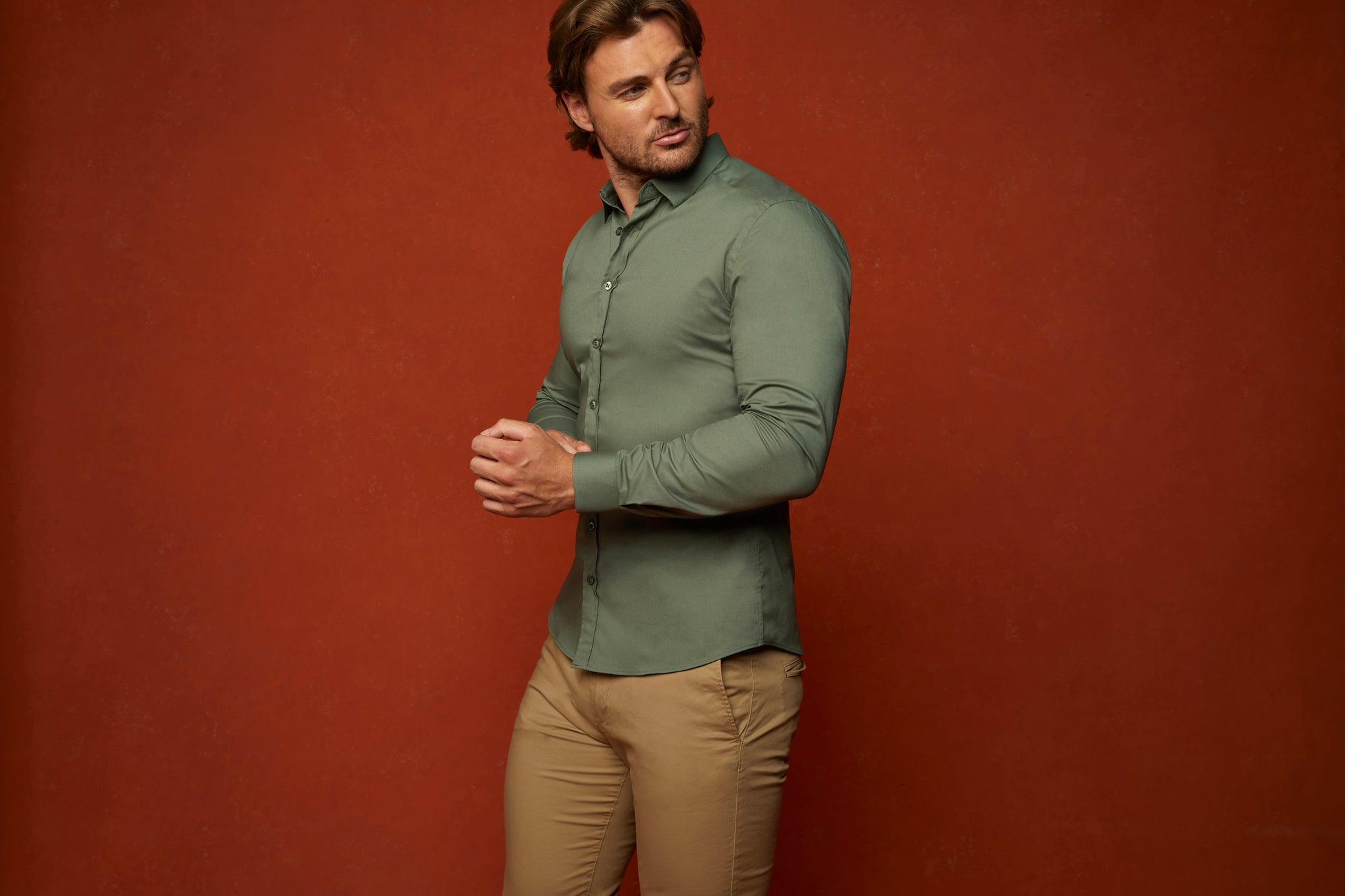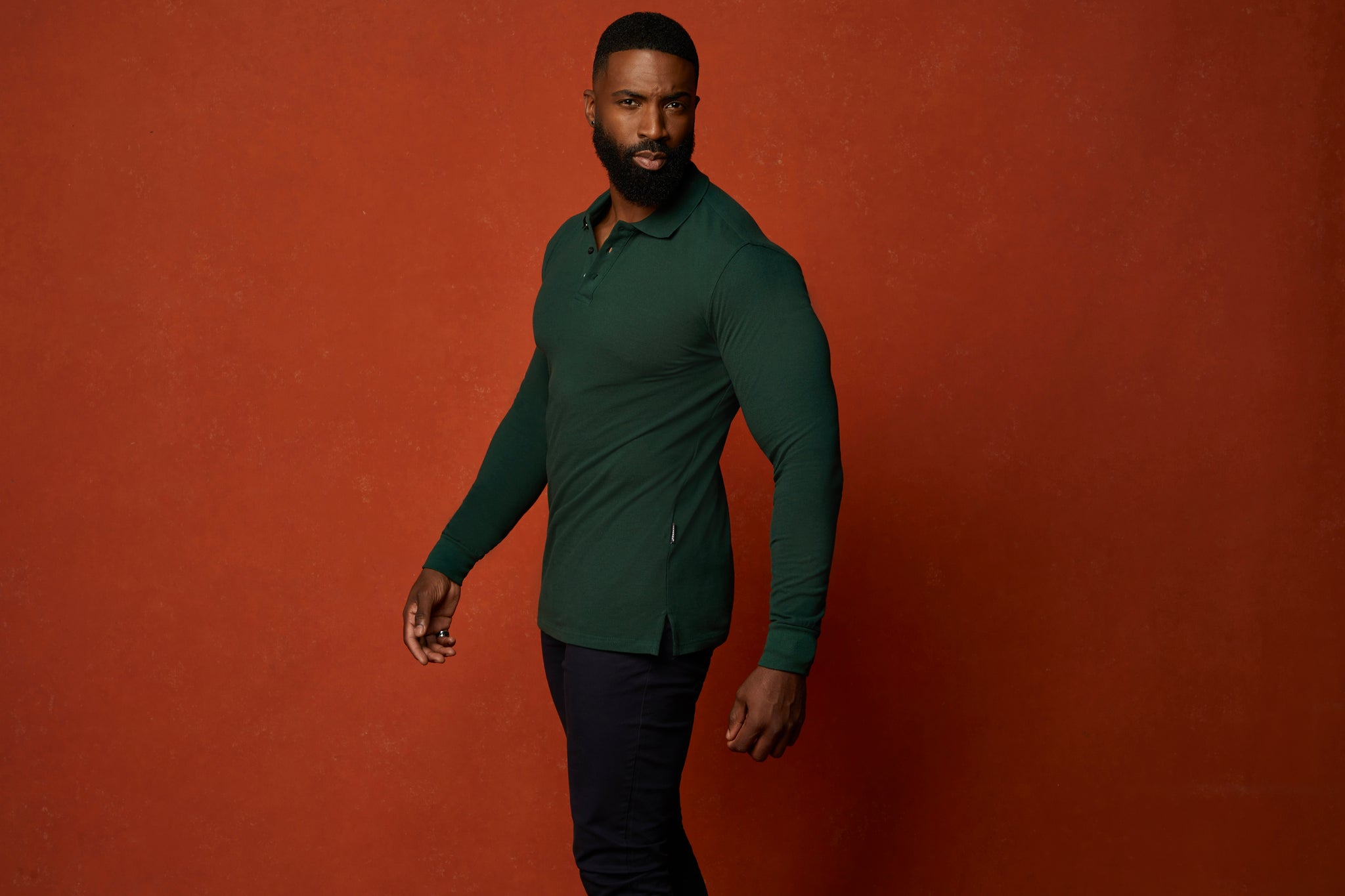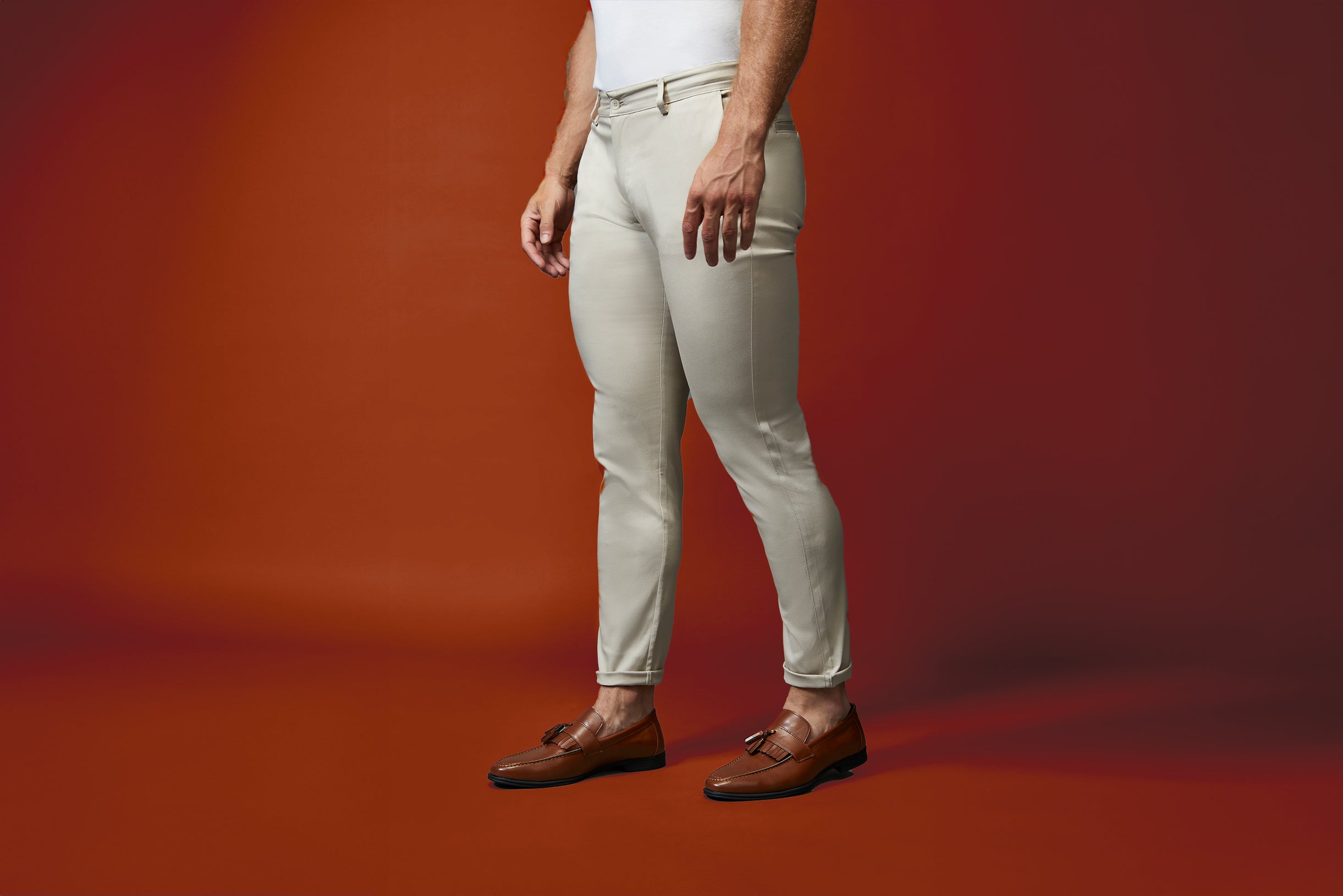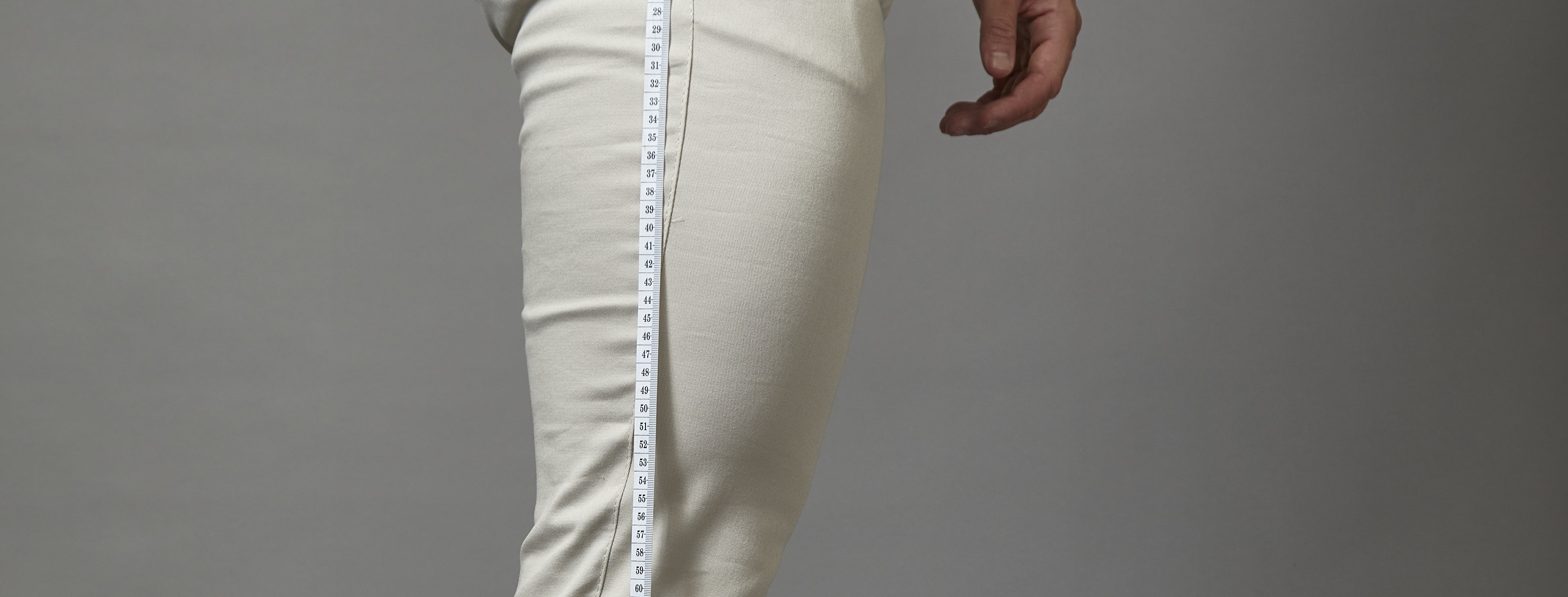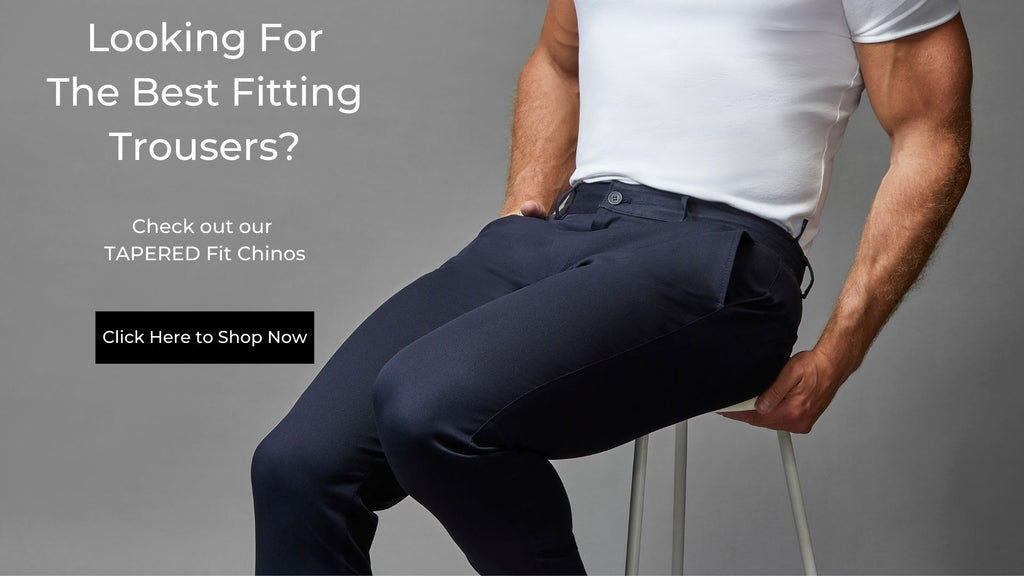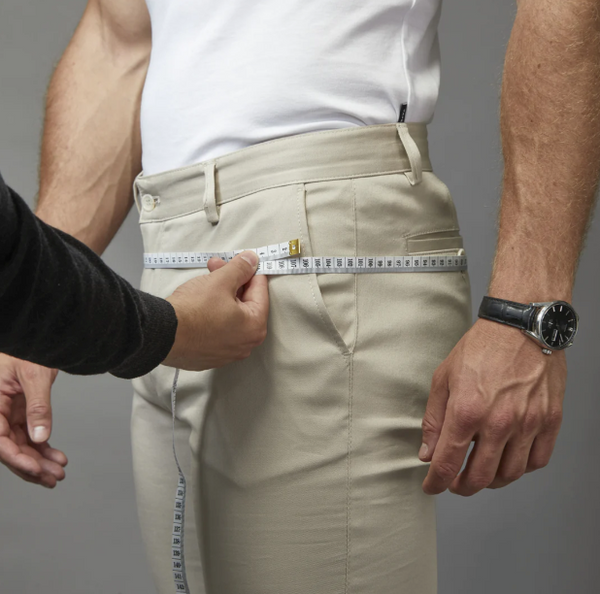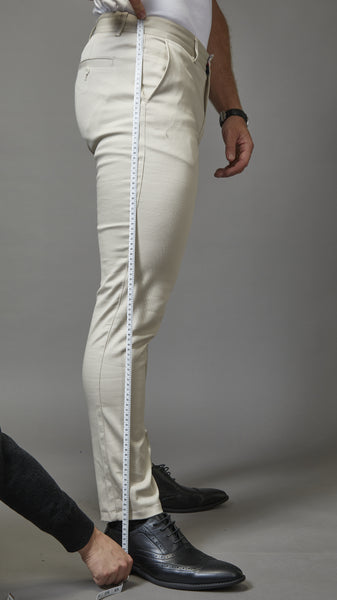Have you ever wondered why the same size pants can fit so differently across different brands? Or maybe you've struggled to find the perfect pant length? You're not alone.
So how do you measure pant length? To measure pant length, also known as the inseam, you measure from the crotch seam down to the bottom of the leg hem along the inside seam of the leg.
In this blog, I will provide everything from pant length measurement guides to steps for measuring pant length, you'll finish this article with not only a tape measure as your new best friend but the perfect length trousers right here at Tapered Menswear.
How Do You Measure Leg Length For Pants?
When it comes to creating a sleek look while keeping comfortable, knowing how to properly measure pant length is essential.
To measure your actual leg length for pants, stand straight and use a soft measuring tape. Start from the highest point of your inner thigh, right at the groin, and measure down to your ankle or the desired pant length. Make sure the tape follows the natural curve of your leg and isn't too tight.
This measurement, known as the inseam, helps in selecting pants that fit perfectly, ensuring both comfort and style.
But another method is to measure the pants themselves:
1 - The process begins by laying your pants out flat on a surface, with the waistband fastened and the fly securely zipped. Take special care to smooth out any wrinkles or folds as these can lead to inaccurate trouser length measurements.
2 - Pinpoint the inseam. To do this start from the crotch seam, where the pants come together, and stretch your tape measure straight down to the hem at the bottom of the pant leg. If you can, try to do this on a hard surface, this will avoid creases and folds with an even spread to capture the most accurate measurement.
3 - Remember your individual preference play a role here in the ideal trouser length, factor in your where you want the pants to sit at the height of the shoes and where you intend to wear the pants at the waist.
How To Measure Pants Using Tape Measure
Although we have covered how to measure pants length. Its good to know the the general pant measurements of your legs for the perfect fit.
shop perfectly fitted trousers
With a simple tape measure, you can guarantee the best fit for comfort every time. Here’s a step-by-step guide covering each area:
Waist Width
To find your ideal waist width, locate your natural waistline, which is usually the narrowest part of your torso or where your pants normally sit. Circle the tape measure around your waist, keeping it parallel to the floor.
It should be snug but not tight, allowing you to breathe and move comfortably. This measurement ensures your pants will sit perfectly around your waist, neither too loose nor constricting.
Front Rise
Measuring the front rise on yourself requires a bit of dexterity. Start from your natural waistline (where you measured your waist width) and hold one end of the tape measure there.
Then, carefully bring the tape between your legs, up to the point where you would like the pants to sit in the front. This measurement dictates how high or low your pants will sit, impacting both the fit and comfort, especially when sitting down.
Back Rise
The back rise is akin to measuring the front rise but focuses on the rear. Begin at the same waistline point at the back, and then pass the tape measure between your legs to the front, mirroring the front rise’s ending point.
This measurement is crucial for ensuring ample comfort in the back, preventing the pants from pulling down when you sit or bend over.
shop perfectly fitted trousers
Inseam Length
For the inseam length, find the highest point of your inner thigh, close to where the front and back rises would meet.
From here, extend the tape measure down the inside of your leg to where you want the hem of the pants to end, typically just above the floor when standing barefoot.
This ensures your pants will be the perfect pants length, avoiding awkward bunching or tripping hazards.
Hip Width
To measure your hip width, wrap the tape measure around the widest part of your hips and buttocks, keeping the tape parallel to the floor.
This measurement helps ensure that the pants will accommodate your hips comfortably, allowing for ease of movement.
Leg Opening Width
Determining the leg opening width directly might require guessing based on your preference for how tight or loose you want the pants to be around your shoes. Instead, consider the style of pants you're aiming for (skinny, straight, bootcut) and use that to guide your desired leg opening width.
shop perfectly fitted trousers
Knee Width
Locate the midpoint of your knee and measure around it for the knee width. This measurement isn't typically as critical for personal measurement unless you're customising pants with a specific fit at the knee, such as tapered or wide-leg styles.
Thigh Width
Find the thickest part of your thigh, which is usually just below the crotch. Wrap the tape measure around your thigh at this point, ensuring it's snug but not tight.
This dimension determines the fit around your thighs, crucial for both comfort and mobility.
Total Length
The total trouser length is measured from your waistline (where you measured your waist width) down to where you want the pants to end.
Stand straight, and run the tape measure along the side of your leg, from waist to ankle or floor, depending on the pant style you desire.
This measurement ensures that the overall length of the pants is just right, complementing your height and the types of shoes you plan to wear.
How Do You Measure Trouser Length UK?
When measuring your trouser length in the UK, the approach remains largely uniform across the board, the only difference is the preference for unit. In the UK we prefer inches whereas its typically centimeters around the globe.
shop perfectly fitted trousers
What Should My Pant Length Be For My Height?
While your total height offers a starting point for finding the "ideal" length, the key measurement in determining pant length is the inseam.
The inseam is crucial because it indicates where the hem of your trousers will align with your footwear.
The perfect pants length can also vary depending on the style of pants you choose whether it's chinos, dress pants, formal trousers or jeans etc.
Also how where you like the pants to fall be it traditional break, no break or full break.
Height |
Ideal Pant Inseam Length (inches) |
Ideal Pant Inseam Length (cm) |
|---|---|---|
| 5'5" | 26-28 | 66-71 |
| 5'6" | 27-29 | 68.5-73.5 |
| 5'7" | 28-30 | 71-76 |
| 5'8" | 29-31 | 73.5-78.5 |
| 5'9" | 30-32 | 76-81 |
| 5'10" | 31-33 | 78.5-83.5 |
| 5'11" | 32-34 | 81-86 |
| 6'0" | 33-35 | 83.5-89 |
| 6'1" | 34-36 | 86-91.5 |
| 6'2" | 35-37 | 89-94 |
| 6'3" | 36-38 | 91.5-96.5 |
| 6'4" | 37-39 | 94-99 |
| 6'5" | 38-40 | 96.5-101.5 |
With these numbers Ive assumed a regular fit with a moderate break (where the pants slightly touch the top of the shoes). This is suitable for most body types and preferences.
If you're still uncertain about the ideal pant length by height, consider consulting a professional tailor.
While online guides are helpful, a tailor can provide personalised recommendations based on your individual height and styling preferences.
shop perfectly fitted trousers
Perfect Length Trousers by Tapered Menswear
Now you know how to measure the length of pants. Choosing the correct length for pants is an art that can significantly enhance your style and comfort.
By understanding aspects like hem breaks, the rise of pants, their position on the ankle, and your body proportions.
Our precision in achieving the perfect fit whether its chinos or jeans, combined with quality materials give not only a tailored finish but comfort all day long.
Exclusively designed for guys with an athletic build. Our chinos are crafted from 4-way stretch that is comfortable, robust and allows complete freedom of movement.
Our team of leading tailors and industry experts have pioneered a unique Tapered fit that allows sufficient room for the thighs, glutes and calves whilst tapering in at the ankle, so there is no need to size up to fit your muscular build.
shop perfectly fitted trousers
No more:
❌ Sizing up for chinos to fit your quads, glutes and calves
❌ Heavy, restrictive fabrics causing discomfort and stiffness
❌ Seams bursting open




